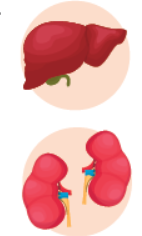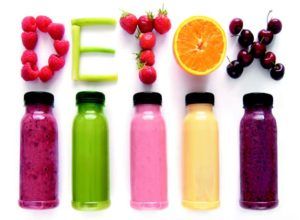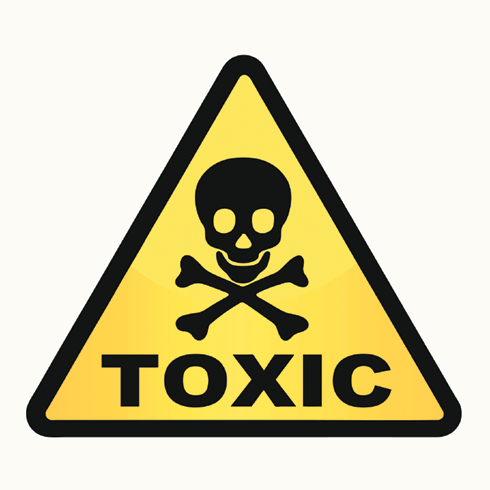Pesticides on produce, arsenic in rice, mercury in fish, plastics, PCBs…hearing about chemicals in our environment and potentially toxic substances in our food and water is distressing and worrisome. It’s no surprise people turn to “detox diets” and “cleanses” to try to combat this seeming assault. But these popular programs are unproven, unregulated, and potentially dangerous. Taking sensible steps to limit exposure and supporting the body’s natural detoxification systems with a healthy lifestyle is the safest and most effective plan.
Detox Defined: Simply put, detoxification is the removal of toxic substances from the body. “The human body has mechanisms of detoxification to deal with both exogenous toxicants (from the environment) and endogenous (those produced inside the body as a result of metabolic processes),” says Joel Mason, MD, senior scientist and director of the Vitamins and Carcinogenesis Laboratory at the Human Nutrition Research Center on Aging. The skin, lungs, GI tract, microbiome, liver, and kidneys are all involved in protecting our bodies from toxic substances.

“The liver and kidneys have great mechanisms for metabolizing many toxic substances,” says Barbarajean Magnani, PhD, MD, FCAP, a professor at Tufts University School of Medicine and director of toxicology at Tufts Medical Center. “With the help of enzymes, the liver helps convert fat-soluble chemicals and toxic substances into more water-soluble chemicals so they can be easily excreted by the kidneys. Toxic substances can also be combined with other chemical substances in the liver to create a less toxic compound that can be safely eliminated.”
Metabolism and excretion of some compounds is completed within a few hours of ingestion or exposure, but some, like lead, mercury, and persistent organic pollutants accumulate in body tissues or remain in the blood (see BPA: How Worried Should We Be?). There is no evidence, however, that over-the-counter cleansing protocols remove these compounds from the body.
Limiting exposure to toxic substances and making healthy lifestyle choices is the best way to support detoxification.
- Avoid radical diets, such as those recommending a very limited number of foods or beverages
- Be wary of products claiming to “cleanse” the colon, speed up the lymphatic system, or rid the body of built-up toxic substances, as these claims do not align with how the body actually works
- Support your liver and kidneys by getting plenty of fluids, controlling blood sugar, maintaining a healthy weight, avoiding refined carbohydrates, salt, and added sugars, getting regular physical activity, using alcohol responsibly, avoiding illicit drugs, and taking medications only as prescribed
- Limit intake of rice and rice-flour products to reduce arsenic exposure
- Scrub hard produce and rinse delicate fruits and veggies well to remove/reduce pesticide residues
- Limit intake of high-mercury fish, such as ahi tuna, king mackerel, marlin, orange roughy, shark, swordfish, and tilefish
- Don’t freeze or microwave foods in plastic containers, as exposure to temperature changes may increase release of chemicals into food (see BPA: How Worried Should We Be? )
- Do not use tobacco products, and use appropriate protective gear when working around hazardous substances
Diets and Cleanses: Detox diets are suggested as ways to remove toxic substances from the body, lose weight, or promote health. “Unfortunately, there is a void in rigorous scientific evidence that so-called detox diets are helpful in any of these ways,” says Mason. Popular “detoxification” programs include fasting, drinking only juices or similar beverages, eating only certain foods, using dietary supplements or herbs, and “cleansing” the colon with enemas, laxatives, or colon hydrotherapy (also called “colonic irrigation” or “colonics”).
There have been only a small number of studies on “detoxification” programs, and these are often of low quality or were conducted in animals and therefore do not have direct application to humans. A literature search turned up no randomized controlled trials assessing the effectiveness of commercial detox diets in humans. As for other claims, a 2017 review said that juicing and “detox” diets can cause initial weight loss because of low intake of calories but they don’t guarantee sustained weight loss. Additionally, if these radical diets should lead to rapid weight loss, toxins sequestered in fat may be released more quickly than the body can process them (although the health impact of this release is undetermined).
There are other potential harms from these products/diets. The U.S. Food and Drug Administration and Federal Trade Commission have taken action against several companies selling detox/cleansing products because they contained illegal, potentially harmful ingredients; were marketed using false claims that they could treat serious diseases; or—in the case of medical devices used for colon cleansing—were marketed for unapproved uses.
Optimizing Natural Systems: The best way to protect your body from toxic substances is to limit exposure and follow healthy lifestyle practices. (See Take Charge! box for suggestions on avoiding environmental toxicants.)
While drastic dietary interventions are not a good idea, health-promoting lifestyle choices are. Eat plenty of plant foods; get sufficient fluids; control blood sugar; maintain a healthy weight; cut back on refined carbohydrates, salt, and added sugars; get regular physical activity; use alcohol responsibly; avoid illicit drugs and tobacco products; and take medications only as prescribed. “The bottom line,” says Magnani, “is to keep your liver and kidneys happy and healthy so they can do their jobs effectively.”

“Detoxification” programs are unregulated, do not have to prove their claims, and can be dangerous. Many make claims at odds with how the body actually functions, and none have rigorous scientific evidence behind them. The National Institutes of Health provides the following cautions regarding detox programs:
- Some juices used in “detoxes” and “cleanses” that haven’t been pasteurized or treated in other ways to kill harmful bacteria can make people sick. The resulting illnesses can be serious in children, elderly people, and those with weakened immune systems.
- Some juices are made from foods that are high in oxalate, a naturally occurring substance. Two examples of high-oxalate foods are spinach and beets. Drinking large quantities of high-oxalate juice can increase the risk for kidney problems and interfere with the absorption of some essential minerals.
- Diets that severely restrict calories or the types of food you eat usually don’t lead to lasting weight loss and may not provide all the nutrients you need.
- Colon cleansing procedures may have side effects, some of which can be serious. Harmful effects are more likely in people with a history of gastrointestinal disease, colon surgery, severe hemorrhoids, kidney disease, or heart disease.
- “Detoxification” programs may include laxatives, which can cause diarrhea severe enough to lead to dehydration and electrolyte imbalances.
- Drinking large quantities of water and herbal tea and not eating any food for days in a row could lead to dangerous electrolyte imbalances.
- Dramatic dietary changes can be dangerous for people with diabetes. If you have diabetes, consult your health care providers before making major changes in your eating habits, such as going on a “detox” diet or changing your eating patterns.

























What about Sous Vede cooking? The food wrapped in plastic and cooked in water — a French method that is currently becoming popular in the U.S.?